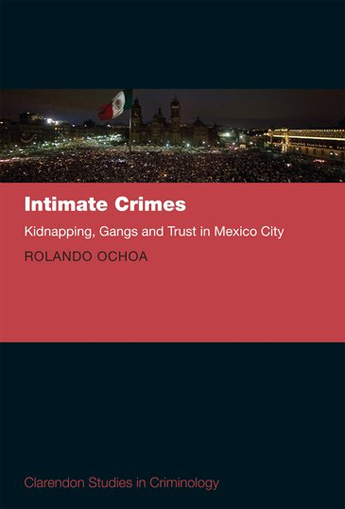Author: Rolando Ochoa
ISBN No: 9780198798460
Review date: 20/04/2024
No of pages: 240
Publisher: Oxford University Press
Publisher URL:
https://global.oup.com/academic/product/intimate-crimes-9780198798460
Year of publication: 19/03/2020
Brief:
The criminologist Rolando Ochoa has written an intriguing and thought-provoking book, from the title onwards.
Consider the recent Oscar-winning Korean film, Parasite, about (without giving the plot and all its twists away, for those who have not seen it yet) a family of ne’er-do-wells who scheme to make a living by posing as unrelated people who each get hired by a wealthy family. They have success, but with catches. That comes to mind as a result of Ochoa’s book, even though it’s firmly set well across the planet, in Mexico City. For although he is an academic in Sydney, he is from Mexico City.
His work is not only the story of a type of crime, part of more general lawlessness in Mexico that has become strikingly worse in recent years, although as Ochoa shows, it dates back to at least the 1960s. It details what crime does to society and people’s behaviour, even wealthy people who can hire members of the same family (as in Parasite) to provide services, including security. For being able to afford a condo behind a wall and other layers of security does not protect you all the time; you have to go out sometime, to work, and send your children to school.
Rolando Ochoa neatly sets out how kidnapping – or rather the risk of it – is ‘another ingredient in the narrative of insecurity’. Fear of crime in general and kidnapping in particular affects everyday Mexicans. You are approached on the street? It may be for directions, or to warn you that your shoelaces are undone, if you’re in Canada. But you’re not there, you may be about to be robbed, or a victim of an ‘express kidnapping’, whereby the criminal gang makes you take cash out of ATMs, and robs you of your watch and what you’re carrying, then lets you go.
Many Mexicans have become less trusting, for the criminals, whether drug dealers or others, are not in some parallel country; they are using the same roads and restaurants. Can you trust the taxi driver you are about to sit alongside? Rolando Ochoa goes into detail as a result of research in a district of Mexico City about how those wealthy enough to hire a driver have perfected a ‘hiring process that seeks to minimise the risk of victimisation’. It’s fascinating for the to and fro of words and gestures.
You, the hirer, want a driver of discretion that won’t abuse trust and make use of knowledge of your household’s routine – of where your child goes to school, when you’ve gone away on holiday, your route to work and back – by passing that on to kidnappers, or turning kidnapper himself. Yet you can only find out that a driver is worthy of trust, once he does an honest job inside your household. Rolando Ochoa goes into forensic detail. Some signals are off-putting; if someone is a drug addict, they may be coerced into betraying their employer by a drug-dealing gang.
Some signals of trust are more trustworthy than others – a letter of recommendation from a past employer, who’s a stranger to you? Could be forged. A clean driving licence; good, as a basic requirement is that the driver knows how to drive; but that’s no proof that someone can’t turn dishonest; ‘honesty is not really visible to the naked eye’. No criminal record; again good, except that thanks of official corruption, maybe someone has bought their clean record. Someone is well dressed and has a good hair-cut? Good to see, but again, that can be easily done and is no proof of integrity. Someone recommended by someone you already employ, or a friend or relative? Better, because that other employee or your brother or colleague would not want to land you in trouble.
Security, as he says, has seeped into many everyday conversations. The wealthy person seeking to employ a driver wants assurances that the person applying for the job, usually informally, has the right qualities; and the job-seeker likewise wants to present those qualities.
This book is of particular interest, for the private security manager reader, if execs are travelling to or staying in Mexico City or Mexico in particular, or indeed other countries suffering violent crime and warring gangs. In terms of business travel security, those procuring drivers and other services have the same dilemmas; because ultimately, no matter how prestigious your corporate name, if you have kept travel security in-house, or how expensive or big-name your contractor, when your exec steps into a car, his safety and even his life is in the hands of the driver. Intimate indeed.
A pricey book, yes, but not as pricey as personal safety, let alone a life.









